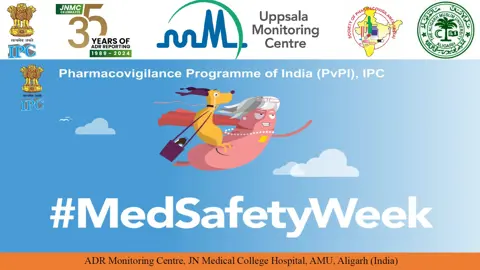
Syed Ziaur Rahman
Professor & Chairman, Department of Pharmacology
Jawaharlal Nehru Medical College Hospital
Aligarh Muslim University, India

The annual #MedSafetyWeek campaign reminds us that medicines work best when they're safe. In Aligarh, healthcare workers came together to make that message a living reality.
Every year, #MedSafetyWeek brings together people from around the world to focus on one shared message: medicines are most effective when they are also safe. This simple idea carries great importance, especially in countries like India, where the use of medicines is widespread across diverse healthcare settings. This year, Aligarh, a small city in the state of Uttar Pradesh, joined the global conversation. A special programme was organised by the Adverse Drug Reaction Monitoring Centre (AMC) at Ibn Sina Academy and Jawaharlal Nehru Medical College (JNMC) in collaboration with the Society of Pharmacovigilance, India, with guidance from the Pharmacovigilance Programme of India and coordination from the Indian Pharmacopoeia Commission.
The day’s activities were designed to encourage healthcare professionals, students, and the broader medical community to think more actively about medicines safety. To set the tone for the event, Professor Syed Ziaur Rahman, the programme coordinator of the AMC, opened the event with a reflection on why medicines safety is everyone’s responsibility. He reminded the audience that medicines are intended to help patients live better and healthier lives, but when medicines cause harm, whether due to side effects, misuse, or lack of awareness, the impact can be serious. Prof. Rahman encouraged participants to view pharmacovigilance not as a bureaucratic requirement, but as a compassionate service rooted in patient care.
Following this, Mr Gufran Ali, the senior pharmacovigilance associate at AMC, spoke about the importance of reporting adverse drug reactions (ADRs). He explained that ADR reporting is not only about identifying what goes wrong, but also about learning and preventing similar issues in the future. Many healthcare workers hesitate to report because they are unsure whether a reaction is “serious enough” or because they fear blame. Mr Ali emphasised to attendees that every report matters, even small or uncertain ones. Each report contributes to a much larger global safety database, where patterns can be identified and shared internationally. He stressed that pharmacovigilance works best when the reporting environment is non-punitive, open, and centred on education.

As part of the tenth annual #MedSafetyWeek, the event also featured a special exhibition of publications from Uppsala Monitoring Centre in Sweden. These included all past issues of Uppsala Reports magazine, which is widely appreciated for making pharmacovigilance stories accessible, relatable, and global in perspective. The exhibition allowed participants to explore case stories from around the world involving real patients, real challenges, and real solutions. The library of Ibn Sina Academy takes pride in maintaining a complete archive of Uppsala Reports, from the very first issue to the most recent issue, joint issue 92-93. This archive serves as a learning “bridge” connecting local practice with international experience.
Behind the scenes, the event was coordinated with the help of Dr Rashaad Ahmad Khan, materiovigilance associate at the Regional Training Centre in JNMC. His support helped ensure that the programme was not only informative but ran smoothly. His involvement also reflects a growing recognition that medicines and medical devices must both be monitored to protect patient safety. The collaboration between pharmacovigilance and materiovigilance teams is an encouraging sign for the future, demonstrating an integrated approach to healthcare risk monitoring.
The event concluded with open discussions where participants shared their thoughts and experiences from clinical practice. Several interns and nurses noted that they often came across situations where they observed side effects to medicines but did not know how or where to report them. The session helped build confidence in this group, offering clarity on the steps to report ADRs and reassuring participants that reporting is encouraged, valued, and supported. All of these activities and more were tagged with the #MedSafetyWeek hashtag on our social media platforms.
As the programme came to a close, one message resonated clearly: pharmacovigilance is not only a system; it is also a culture. The culture grows when people speak, share their experiences and learnings, and act together. This year’s #MedSafetyWeek in Aligarh was a meaningful step toward nurturing that culture, ensuring safer treatment for every patient, every day.
More than 200 participants gathered in Mérida, Mexico, to discuss regional cooperation and emerging technologies in medicines safety across Latin America.
09 October 2025
Since 2020, the ICPV has worked to improve drug safety reporting at Instituto Nacional de Cardiología Ignacio Chávez, with promising outcomes.
16 October 2025
Two-thirds of pharmacists in Nigeria witness weekly cough syrup abuse, yet poor reporting systems and unclear guidelines prevent effective intervention, leaving its youth at risk.
03 December 2025